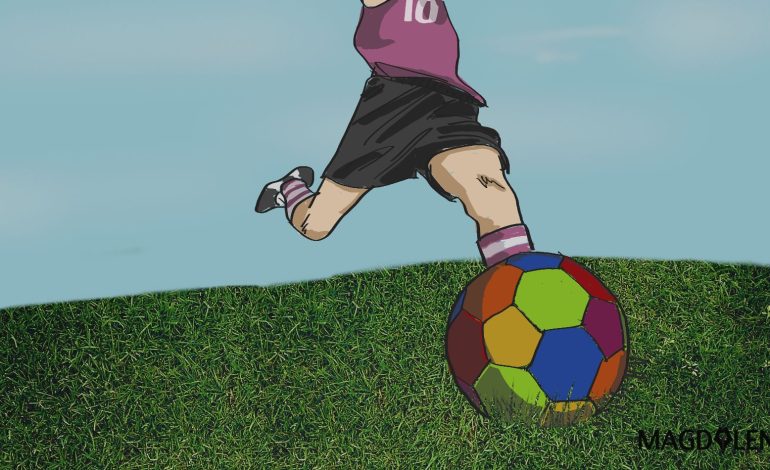Football as the Last Bastion of Masculinity

You might dislike football or do not care about the FIFA World Cup, but you really cannot escape it. It’s on your social media feed, it’s on the front page and the news ticker, it’s all over the world. FIFA and its sponsors are successful in making the World Cup a global carnival, bigger than the Summer Olympics. The simplicity of football makes it a universal sport in which any team with proper skill, training, and luck could pose a challenge to the elite teams.
World Cup 2018 is held in a time when social media are more integral to our lives. Even when you’re reading another topic, someone you admire would give an update on the latest moment in the World Cup. On the other hand, marketing enthusiasm for this World Cup is not as great as in the previous editions. One reason is because this year’s World Cup is held in Russia.
Russia has mixed reputation. For some people in Indonesia, it’s a proud country that defies both United States and radical Islam, a role model for Indonesia. For white supremacists in the West, it’s the true leader of Christian civilization that fights against feminism, gay rights, and diversity.
To Western liberals Russia has renewed the Cold War by poisoning former citizens of USSR in Britain, spreading homophobic and Islamophobic hoaxes online, and supporting both left-wing figures like Julian Assange and right-wing figures like Richard Spencer. Both liberals and socialists worried that the World Cup would become a parade of triumph for Vladimir Putin.
Russia’s time of glory has passed, and, instead of their president, Russians hailed their footballers. The carnival and its problems, meanwhile, continued. Just after the match between Argentina and Iceland, my fear was confirmed as Trans TV’s reporter in Russia asked fans an important football question: Latin girls or Nordic girls?
True, more women have gone to stadiums to watch football over the last thirty years, and since the 1990s, “Beautiful supporters” galleries have become a staple of tabloids and then websites. More women have also appeared on football shows, usually as hosts, quizmasters, and readers of social media posts. Yet, problems remain.
Even in the West, women’s participation in the coverage of the World Cup is still not well-received. Both hosts and commentators have received sexist abuses, like Lucy Zelic in Australia and BBC’s Vicki Sparks. Out of the 16,000 journalists accredited to cover the World Cup, only 14 percent are women.
Female reporters in Russia were prone to harassment by supporters, including during live broadcast. They witnessed similar harassments experienced by translators and volunteers. Brazilian journalist Luiza Oliveira expressed her belief that the lack of awareness of feminism and women’s rights in Russia might contribute to the sense of entitlement among men there. Racism doesn’t help too.
Just before the tournament began, Russian communist parliamentarian Tamara Pletnyova warned Russian women against having sex with “men of another race”. Pletnyova was responding to a question about a spike in births from foreign fathers following the 1980 Moscow Olympics. Burger King Russia had to cancel a marketing stunt offering money and free Whoopers for “women impregnated by a World Cup player”.
There are women who like football, there are feminists who passionately support a club or country. Men like them, but many men seem to prefer women who don’t understand football better than themselves. These men are not happy to find a woman who can make a better call on offside or foul, or who have better knowledge on tactics and players. Ultimately, they don’t like to see women playing football.
I enjoyed seeing female footballers making witty tweets throughout the World Cup, but not all men are amused. Sexist responses would follow, sometimes escalating to rape threats and death threats. Fans of women’s football also periodically remind the media that top male footballers might have broken the record of other male footballers, but there are female footballers whose records still stand. Many sponsors of the 2018 (Men’s) World Cup are Chinese companies, because Western and Japanese sponsors are said to be more interested in the 2019 Women’s World Cup.
So many people think that football is exclusively a man’s sport, and only men can enjoy football. Too many men believe women won’t enjoy watching football anyway (although I have known a couple of men who don’t like football). As antagonism to women’s football shows, many men want to keep football a man’s realm.
Perhaps there are men who believe they are forced to share everything with women these days. Women are in computer science (although computer programming used to be women’s job), women are in science fiction and superhero movies, women are in philosophy and security studies, and now women are in football (and other team sports).
Perhaps for these men, more women involved in football means they can no longer make sexist comments. Maybe they worry women will feminize football, making it less manly. Indeed, women’s football in the West support LGBT rights and many female footballers are openly gay, something that is still practically unthinkable in men’s football.
Even when women don’t follow football, they can bear the brunt of violence related to the sports. Pathway Project, an English domestic violence charity, launched a viral campaign saying that domestic abuse cases in England increase if the Three Lions are defeated. Alcohol, drug, and gambling contribute to the act of violence, besides all the toxic masculinity that accompanies watching football – ego and machismo.
Indonesia has been hosting the Southeast Asian women’s football championship for the past two weeks but no media covers it, in contrast to the U19 men’s tournament. Our women’s football quality is abysmal because there are no sponsor, no facility, and no audience. In the region, perhaps only Australia, Thailand, and Vietnam care about women’s football.
Still, I am optimistic that eventually, men will learn to share space with women in watching football. More Western networks will introduce female commentators and analysts, while female hosts in Indonesia have made quality points and questions to both the analyst and the audience. More male players have promoted women’s team and tournament in Europe. Like in many other things, masculinity in football will be redefined and improved.
Mario ponders on why people are fascinated with dictators. Find @MarioRustan on Twitter.






















